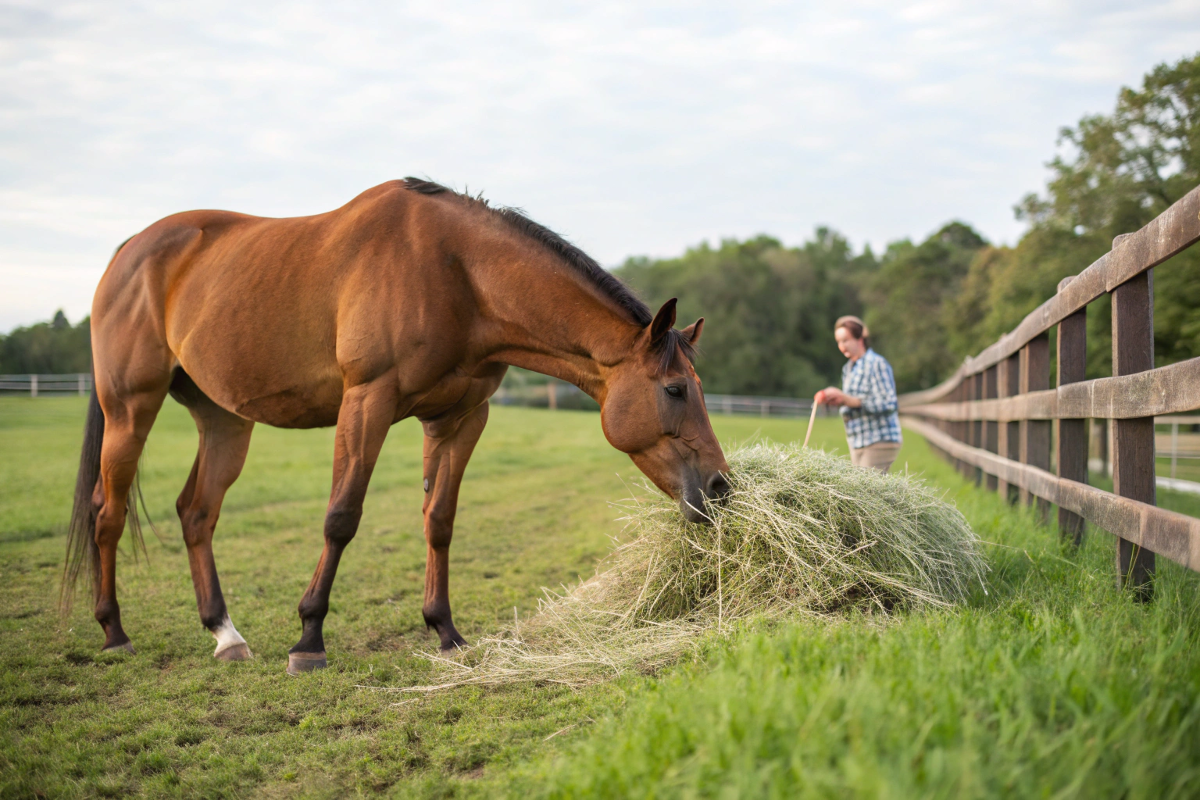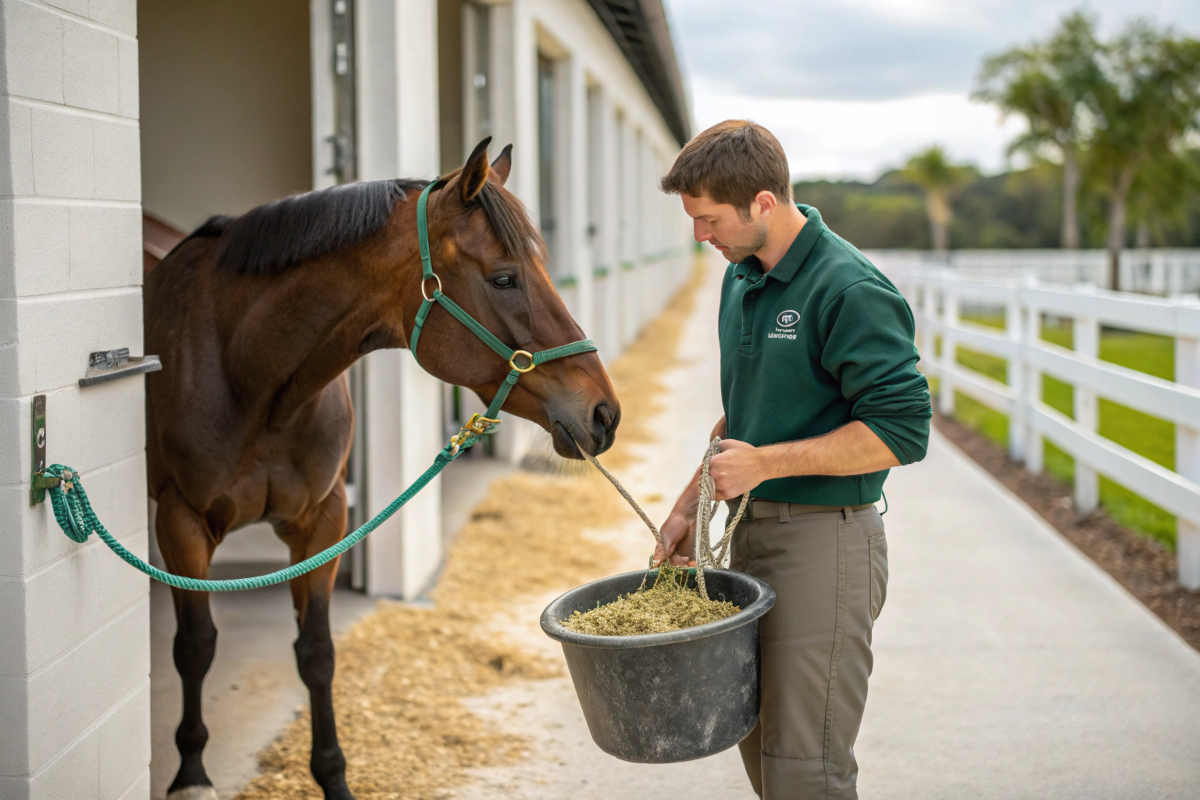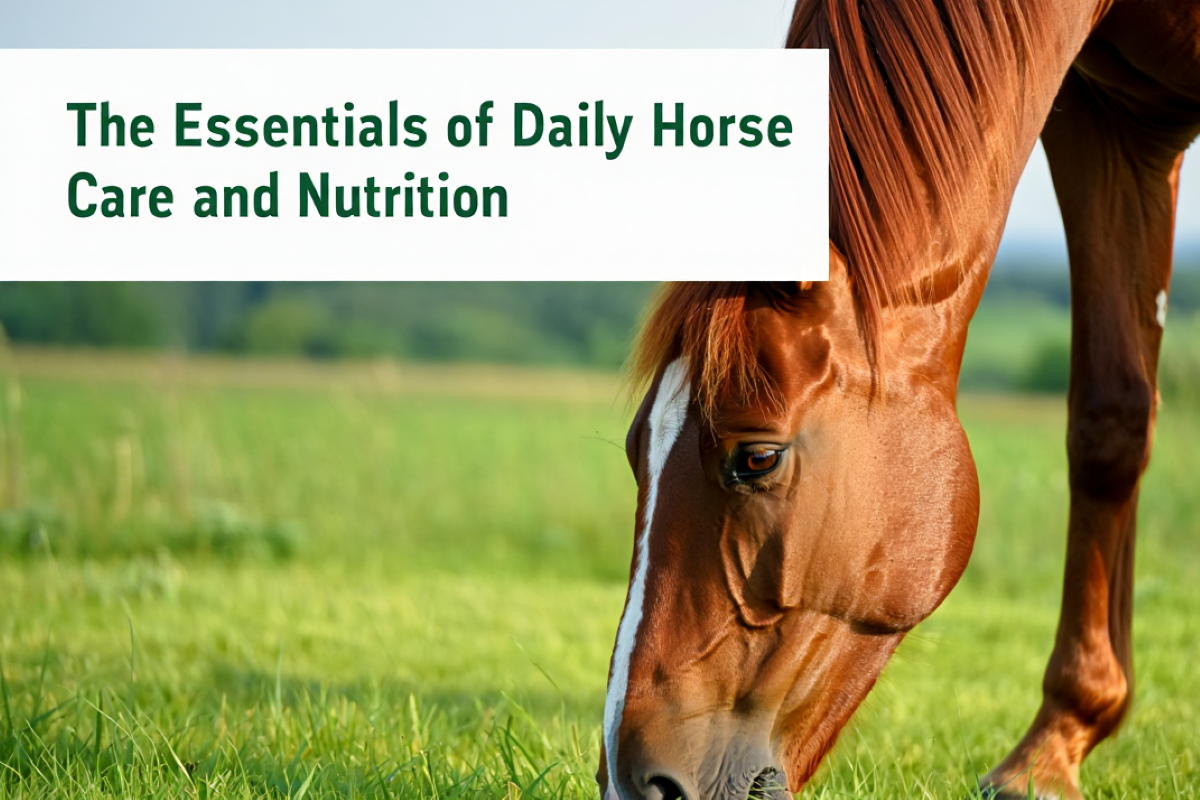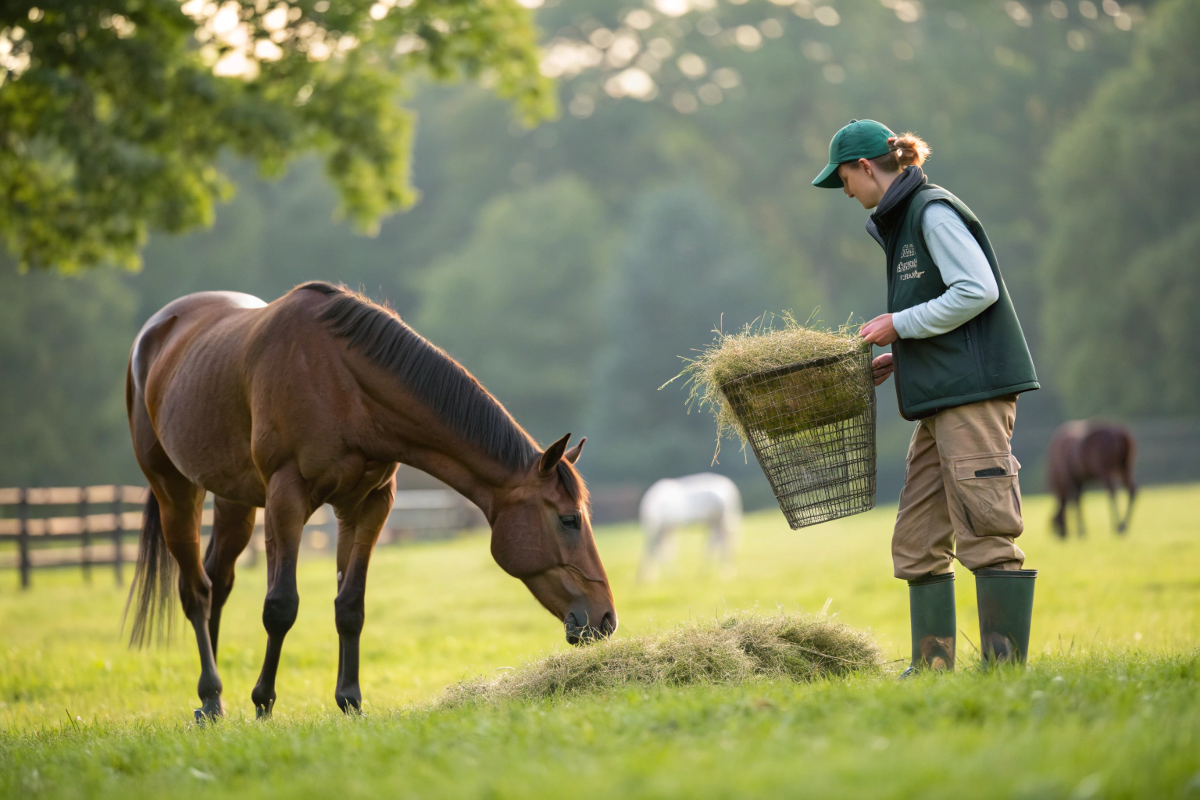The Essentials of Daily Horse Care and Nutrition

Proper horse care is a daily responsibility that requires dedication, knowledge, and a deep respect for these magnificent animals. At the heart of excellent horse care is nutrition—providing your horse with the right balance of forage, supplements, and clean water to ensure a long, healthy, and productive life.
The Essentials of Daily Horse Care and Nutrition: A Guide for Every Owner
Whether managing a high-performance athlete or a beloved family companion, understanding and applying sound care and feeding practices are essential to your horse’s well-being.

Daily Horse Care: Beyond Feeding
Daily horse care is about more than just feeding and watering—it’s a commitment to the animal’s health, safety, and happiness. The following essentials should be part of every horse owner’s routine.
-
Regular Health Checks
Every day, spend a few minutes observing your horse closely. Look for signs of injury, lameness, swelling, lethargy, or changes in behavior. Check their eyes, nose, and coat for abnormalities. Run your hands down their legs to check for heat or swelling and feel their hooves for cracks or debris.
Monitoring manure output is also crucial—unusual consistency or a decrease in volume can indicate digestive issues or dehydration.
-
Hoof Care
Hooves should be cleaned and inspected daily with a hoof pick. This removes stones, manure, and other debris that can lead to bruising or infection. Regular farrier visits (typically every 6–8 weeks) are necessary to maintain balance, correct issues, and prevent long-term hoof damage.
-
Grooming and Skin Maintenance
Grooming removes dirt and loose hair, stimulates circulation, and strengthens your bond with your horse. Daily grooming sessions also allow you to identify skin irritations, parasites, or wounds early.
Key grooming tools include a curry comb, stiff brush, soft brush, hoof pick, and mane/tail comb. Use clean equipment to prevent skin infections from spreading between horses.
-
Exercise and Turnout
Horses are natural athletes and thrive on regular movement. Whether through training, trail rides, lunging, or turnout, daily activity supports digestive function, mental health, and physical fitness.
If your horse is stabled, ensure they get turnout time in a safe paddock or pasture. Social interaction, grazing opportunities, and free movement are essential for physical and psychological health.

Nutrition: Forage First, Always
When it comes to horse nutrition, “forage first” is more than a mantra—it’s a fundamental principle backed by science. Horses are herbivorous grazers designed to consume forage throughout the day. Their digestive systems are optimized for fiber-rich materials, not grain-heavy feeds.
-
Understanding Forage vs. Feed
It’s important to distinguish between forage and feed when discussing horse nutrition.
- Forage refers to the fibrous plant material that forms the base of the equine diet, primarily in the form of hay cubes, forage pellets, or pasture grasses. It supports gut health and prevents colic, ulcers, and behavioral issues.
- Feed, conversely, typically refers to manufactured grains or concentrates that supplement forage when extra calories or nutrients are needed (e.g., for performance horses, breeding mares, or growing foals).
For horses, forage is not optional—it is essential.
-
Pellets and Cubes: Modern Forage Solutions
Forage doesn’t have to come from traditional baled hay. Many horse owners are turning to pelleted and cubed forage products as safer, more consistent alternatives. These products are especially helpful when:
- Dealing with respiratory issues (dust from baled hay can exacerbate problems)
- Forage quality is inconsistent or hard to source locally
- Feeding high-performance or senior horses with higher nutrient demands
- Managing travel or stable transitions
Cubes are recommended for high-performance horses because they deliver excellent-quality, tightly packed forage with reduced waste and dust. Pellets, while not a replacement for hay or cubes, are ideal as a nutritional supplement on top of a forage base.
Soaking pellets or cubes is recommended—a 30-minute soak or until softened ensures proper hydration and reduces the choke risk, particularly in older or greedy eaters. However, soaking is not mandatory if your horse can chew safely.
-
Choosing the Right Forage
The right forage product depends on your horse’s age, workload, health status, and metabolic needs. Consider:
- Alfalfa cubes or pellets: High in calcium and protein—ideal for performance horses, lactating mares, or those with higher calorie demands.
- Timothy pellets/cubes: Moderate energy, suitable for easy keepers or maintenance horses.
- Mixed forage options: A balanced choice offering diverse nutrients from both legume and grass sources.
Choose bagged products from reputable providers that guarantee quality and consistency. At Greenway Animal Nutrition, our premium forage pellets and cubes are carefully formulated to provide complete, high-quality nutrition that supports digestive health, muscle development, and sustained energy levels.
Hydration: The Forgotten Essential
Water is the most important—and most overlooked—nutrient in horse care. Horses need 5–15 gallons of fresh water daily, depending on size, weather, activity level, and diet. Forage-based diets increase water needs, especially if dry feed is being consumed.
Ensure water is clean, easily accessible, and refreshed daily. In colder climates, heated buckets or trough de-icers help prevent freezing and maintain intake.
Signs of dehydration include:
- Tacky gums
- Reduced manure output
- Lethargy
- Elevated heart rate
Encouraging water consumption can include:
- Offering soaked forage products
- Adding electrolytes (consult your vet first)
- Providing salt blocks or loose salt
Bedding: Clean Comfort for Happy Horses
The stable should be a place of rest and safety. Choosing the right bedding is key to promoting hoof health, respiratory clarity, and overall comfort.
Avoid using loose straw or organic matter that can harbor mold or parasites. Instead, opt for bagged bedding, such as:
- Pelleted straw bedding: Highly absorbent, low-dust, and biodegradable. Ideal for horses with respiratory sensitivities or those kept in enclosed barns.
- Chopped straw bedding (bagged only): Traditional option, now processed for cleanliness and safety. Offers warmth and cushioning while reducing the risk of contamination when bagged and stored correctly.
Clean the stalls daily—remove wet spots and manure and fluff up clean bedding to encourage rest and prevent sores.

Feeding Schedules and Consistency
Horses thrive on routine. Sudden changes in feeding schedules or forage type can cause digestive upset or colic. Follow these best practices:
- Feed at the same time each day to maintain gut motility and reduce stress.
- Divide feedings into multiple meals rather than one large portion—this mimics natural grazing behavior and keeps digestion stable.
- Introduce any changes gradually—whether it’s a new forage pellet, cube, or supplement, phase it in over 7–10 days.
Use a reliable feeding chart and monitor your horse’s body condition score (BCS) monthly. Consult your vet or an equine nutritionist for guidance on adjusting rations.
Special Considerations for Performance Horses
High-performance horses demand more from their diet. They burn more energy, experience higher oxidative stress, and need rapid recovery support. That’s why quality forage in the form of cubed products is vital. Cubes provide:
- Highly digestible fiber for slow-release energy
- Greater nutrient density per pound
- A consistent, contaminant-free product
Adding forage pellets as a supplemental source enhances the mineral and vitamin profile, particularly when blended with omega fatty acids, amino acids, or other performance-specific formulations.
Horses in heavy work also benefit from soaked forage to maintain hydration and prevent heat stress.

Forage for Special Populations
-
Senior Horses
As horses age, their ability to chew and digest traditional hay can decline. Pellets and soaked cubes are safe, effective solutions that deliver necessary fiber and nutrients without choking risks.
-
Horses with Metabolic Issues
Choose low-sugar, low-starch forage options for horses with insulin resistance, Cushing’s, or laminitis history. Analyze your forage and work with a nutritionist to avoid excess non-structural carbohydrates (NSCs).
-
Foals and Pregnant Mares
These groups require more protein, calcium, and phosphorus. Cubed alfalfa or a high-quality forage mix supports fetal development, lactation, and foal growth. Always pair with veterinary oversight.
Monitor, Adjust, and Listen to Your Horse
No two horses are the same, and your horse’s nutritional needs may change over time. Seasonal shifts, workload changes, age, and health conditions all play a role in determining the optimal care plan.
Pay close attention to body weight, coat condition, energy levels, and manure consistency. Keep a daily log or use an equine management app to track feeding, exercise, and health notes.
Remember: horses talk with their behavior. A sudden shift in mood, appetite, or energy can signal an underlying issue—nutritional or otherwise.
![]()
Partnering for Better Horse Health
Caring for a horse isn’t just about routines—it’s about relationships. The bond you share with your horse deepens with every grooming session, feeding, and ride. When you provide the best possible care, you empower your horse to live a long, healthy, and fulfilling life.
At Greenway Animal Nutrition, we recognize that high-quality feed is essential for maintaining healthy, well-nourished horses. That’s why we offer premium forage products designed to meet the needs of horse owners, breeders, and trainers. Whether you’re caring for a high-performance racehorse, a trusted riding companion, or a herd on your farm, our diverse selection of forage pellets and cubes provides a reliable feeding solution.
Explore our range of bagged, clean, and consistent forage options today. Contact us for expert advice on choosing the right nutrition plan tailored to your horse’s unique needs.